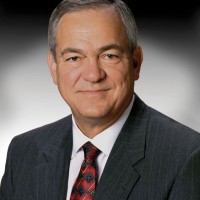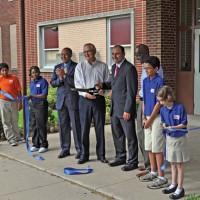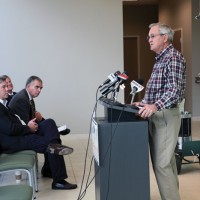Retirement? What's That?
Glen Barton's post-Caterpillar 'career' is helping improve education in Peoria, grow new businesses
Some days Glen Barton isn't sure he is retired, even though that's what they called it when he left Caterpillar Inc. in 2004 after five years as the company's chairman and CEO.
He keeps finding things to do with his time, some of it what he seeks out and some of it what others ask him to do. But the bottom line is simple:
"I just want to make Peoria a better place to live. Polly (his wife) and I both want that. So we want to tackle issues that are important to the community, such as education, to make that happen. I have more opportunities to do things than I have time to do them, as you can imagine, but I also can decide which ones to devote most of my efforts to doing," Barton said recently.
The interview for this story was by telephone as he and Polly are vacationing in California, which they try to always do during the first couple months of the year. "Part of being retired is being able to get away for a couple months when we want to, so I don't want to be too tied down," he said.
But when he's in Peoria, his adopted home because of his long and distinguished career at Caterpillar, he can be found meeting with potential start-up business entrepreneurs, attending a board meeting or even wielding a paint brush, as he did in preparing the former Loucks School on North University Street to become the new Quest Charter Academy last year.
"Whatever it takes, if I think it's worthy I want to help," Barton said.
Barton is a native of Alton, Mo., and grew up with his family on his grandfather's farm.
"We lived on a small farm. My father worked in the Post Office so my Grandfather and we three boys sort of ran the farm. My oldest brother was 8 years older and then my next 2 years older. We sort of got the turn to be the 'go to' guy. It was tough to make a living off poor Ozark Mountain land but all of us earned much of our college expenses raising pigs, doing farm work for others, that sort of thing," he said.
Barton went to the University of Missouri-Columbia and earned a bachelor's degree in civil engineering in 1961. Soon thereafter he joined Caterpillar as a college graduate trainee and began a 43-year career that culminated with his ascension to the top of the world's largest heavy equipment manufacturer.
While he was chairman, Caterpillar implemented the 6 Sigma operating method throughout the company, a method proven to enhance efficiency and improve quality and safety. Barton said implementing 6 Sigma, which has since been emulated at companies and organizations throughout the Peoria region, was probably the biggest single and most important contribution he made at Caterpillar.
"I would like to think there were many contributions. There are many things I am proud of, such as the fact that while I was chairman we never went through a single quarter with a loss even though we went through a recession early in my tenure. I don't think we would have been able to accomplish that without 6 Sigma," he said.
Barton also noted that he was part of Caterpillar structural reorganization in the late 1980s under then-CEO George Schaefer. That reorganization, which split the company into business units that were each responsible for their own operations and profits or losses, was key to helping the company survive and grow. Before then, Barton said, the company never had a year where it made a profit when sales were down.
At Caterpillar Barton was involved in the community, as well. While CEO he helped establish the Peoria Civic Federation, which is a group of local business leaders, and was a founding director of Peoria NEXT because he was one of the business leaders who saw a need for a technology-based business incubator.
Those kinds of experiences not only helped achieve Caterpillar's top rung, Barton said, it put him in demand when he retired from the company. "All of a sudden I was being approached by people needing help with one thing or another, including people needing help getting started with a business. I realized we needed some kind of model to help these entrepreneurs and to give financial assistance," he said, explaining the role of another group he started, Central Illinois Angels.
The Angels are a group of business leaders with the experience and wherewithal to help new entrepreneurs with finances, advice or whatever is needed. Members look at the business opportunities being brought to the community and choose which ones they want to invest in as individuals.
The Angels were the single largest investor in Lumec Control Products in Peoria and the Main Street Commons apartment complex near Bradley University.
The Bartons have not limited their time and finances, however. They were instrumental in helping the Peoria Park District upgrade the Peoria Zoo, including the Africa! exhibit, and most recently the new entrance for the zoo that is now under construction.
His largest project, and one he says is extremely important to the region, was heading the effort to bring Quest Charter Academy to Peoria.
The idea stemmed from challenges being faced by Peoria School District 150 in meeting basic requirements in math and sciences. Barton was part of a city Workforce Development office group looking into improving education and it was there that he got his first "detailed exposure to the problems in our schools. It was alarming. We were putting kids into the middle schools who don't meet the basic requirements to succeed."
Barton also was aware from his experience at Caterpillar that there were problems filling some technical jobs because of a lack of local skilled workforce and said it was frustrating to watch students that had talent take their skills elsewhere.
That Workforce Development committee, which included Jack Gilligan, chairman of Talent Force 21, former District 150 administrator Cindy Fisher and Workforce Development director Bashir Ali, discussed a myriad of options, including year-round school. The group also was aware the charter school approach had worked well in other urban areas.
A group was formed to study the charter school concept more in depth, including visiting such schools in Chicago, St. Louis and Indianapolis. The Peoria Charter School Initiative was then formed, with Barton as its president, but finances were going to be a problem. Starting the school was going to have to wait at least a year.
Then Caterpillar stepped forward with a $500,000 match offer and the group was able to raise the rest of the funding needed to launch the school, which is a tuition-free college preparatory school. It opened in 2010. "We had to put it together in a hurry. We painted all the walls, put the furniture together, cleaned all the blackboards and such," he said.
"I think people are already starting to see a difference. It's important that we have a solid relationship with District 150 and its administration, because the Quest students go into District 150's student tracking system and we get Title 1 funding from the district," Barton said.
Barton said his own upbringing is another reason Quest is important to him. "I have often used the expression that my college education was a springboard to another world and set of opportunities. I probably would have been stuck in Oregon County (Missouri) forever, had I not gone to the University of Missouri and then interviewed for jobs with companies such as Caterpillar. That's why I feel an education is so important: it gives you a chance to go from a 'nobody' to a 'somebody'. A big difference, and I want our kids at Quest to have that chance," he said.
Barton, now 72, said he plans to stay busy in the community and other aspects of business. He serves on the boards of directors for a couple corporations, including Valmont Industries and Newmont Mining Corp. He also is president of the Tri-County Venture Capital Fund.
He said he wants to continue to lead by example and energize others. "I still have a very active mind and a lot of energy and enthusiasm. I can satisfy my urges to be involved and I enjoy doing it. One can only play so many rounds of golf," he said.
The Bartons plan to remain active for a long time to come. "We think we can still provide leadership and influence where needed," he said.
Peoria is where they plan to stay. "We think of Peoria as our home. Peoria is Polly's home and I'm more from Peoria than any place else. It's a good place to live. We find it a very desirable place to live. It's quiet, peaceful. The weather in spring, summer and fall are about as nice as you can have. January and February are usually a different story, but being retired we can go someplace warm then," he said. "But we'll always come back."
Quest Charter Academy
Local Not-For-Profit chosen by Glen Barton
When Glen Barton saw that students in Peoria needed help meeting the basic education requirements in math and science, he headed a group that is trying to make a difference.
That group brought to Peoria the Quest Charter Academy, described as "a public charter school that provides its students with an innovative world class education, rich in math, science and technology focused on preparing students to become bold inquirers, problem solvers and ethical leaders, skill-ready for post-secondary education to meet the challenges of a competitive global workforce."
Calling it his biggest project since he retired as chairman and CEO of Caterpillar Inc. in 2004, Barton chose Quest Charter Academy to receive the $10,000 award from The Peorian if he is selected as the inaugural The Peorian of the Year.
Quest Charter Academy is a tuition-free, state-supported college preparatory school and open to all students middle school through high school. The school focuses on establishing a culture that values and celebrates success, teaches shared values, sets high expectations, builds pride, and fosters a sense of community and belonging.
The culture and climate of the school incorporates five essential attributes:
• Focus on student achievement;
• High expectations;
• Commitment;
• Determination;
• Involvement.
For more information, including enrollment procedures, go to
www.questpeoria.org
or call (309) 402-0030.



